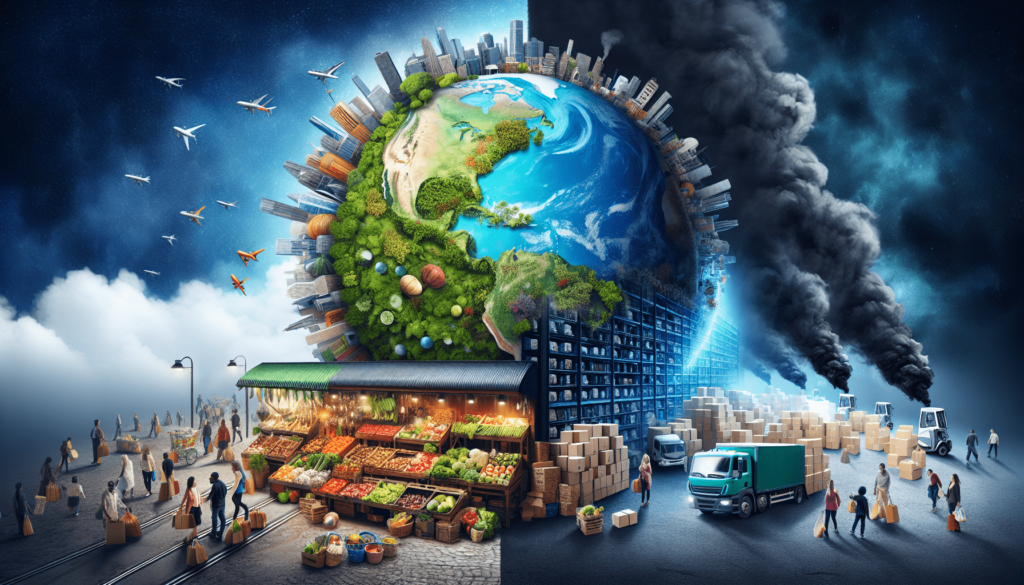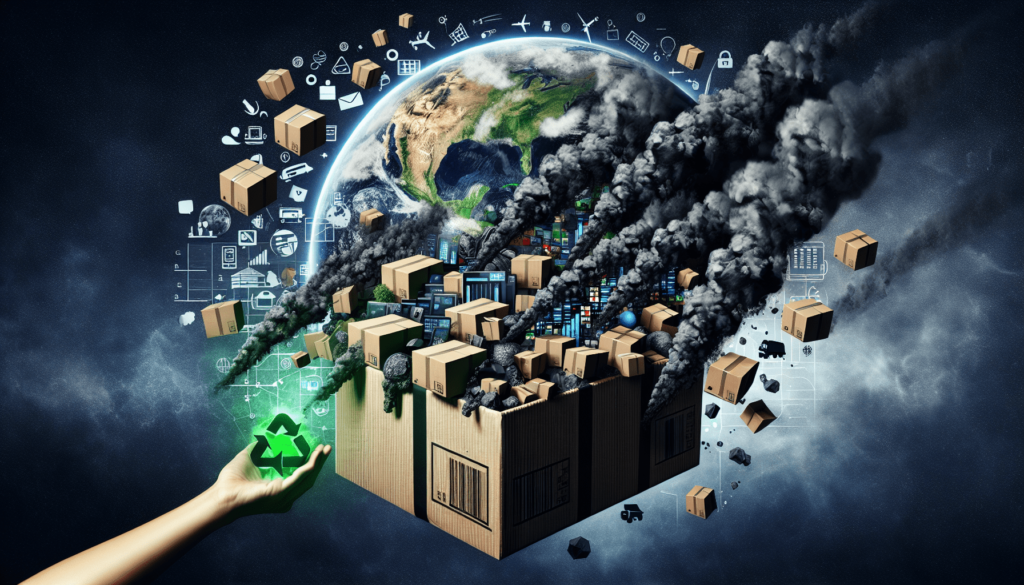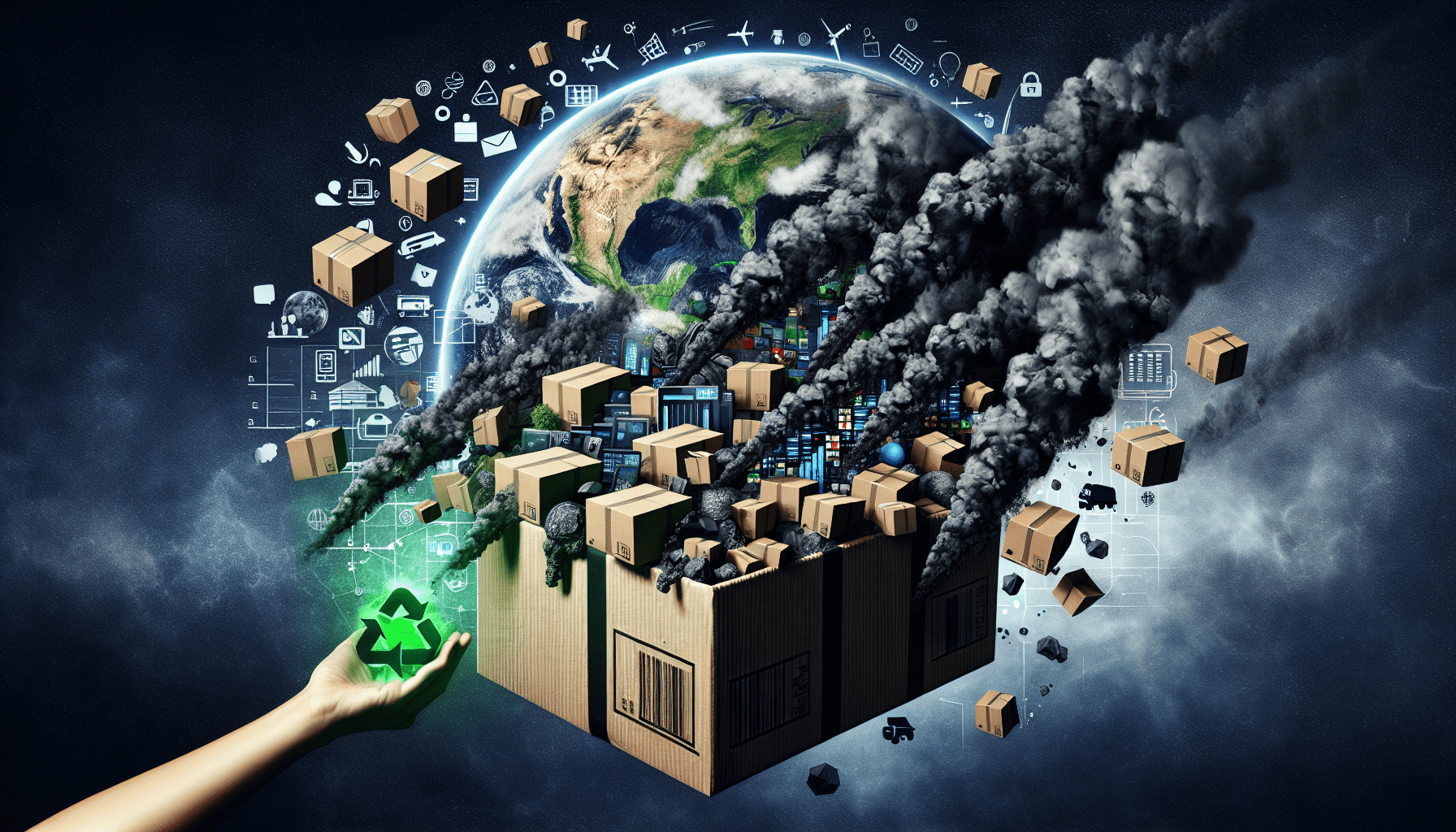In today’s tech-savvy world, online shopping has become increasingly popular, offering convenience and accessibility at our fingertips. However, have you ever stopped to consider the environmental implications of this growing trend? From the packaging waste to the carbon emissions generated from transportation, the environmental impact of online shopping is undeniable. This article explores the various ways in which your online purchases can leave a lasting mark on the planet, urging us all to rethink our buying habits and strive for a more sustainable future.

Carbon Emissions
Transportation emissions
One of the major environmental impacts of online shopping is the significant increase in carbon emissions from transportation. When you choose to shop online, the products you purchase need to be delivered to your doorstep. This requires transportation vehicles, such as trucks and vans, to travel long distances in order to reach you. The emissions from these vehicles contribute to greenhouse gas emissions, which contribute to climate change.
Packaging emissions
Another key contributor to carbon emissions in online shopping is the packaging materials used to protect and transport the products. Many times, excessive packaging materials like bubble wrap, Styrofoam, and plastic wrap are used to package a single item. These materials are not only harmful to the environment but also require energy-intensive production processes. The carbon emissions produced during the manufacturing and transportation of these materials further contribute to the overall carbon footprint of online shopping.
Energy Consumption
Increased demand for electricity
The rise in online shopping has led to an increased demand for electricity. Warehouses and distribution centers that store the products require large amounts of electricity to run their operations efficiently. Additionally, the overall energy consumption of the entire online shopping system, from product manufacturing to final product delivery, requires significant amounts of energy. This energy consumption can lead to increased greenhouse gas emissions, as the majority of the world’s electricity is still generated by burning fossil fuels.
Data centers
Data centers play a crucial role in online shopping, as they store and manage the vast amount of information involved in e-commerce. These data centers require extensive energy for cooling, servers, and other infrastructure needs. The energy consumed by data centers contributes to the carbon emissions associated with online shopping. Furthermore, the continuous growth of online shopping results in an increasing number of data centers being built, exacerbating the environmental impact.
Waste Generation
Packaging waste
Online shopping generates a significant amount of packaging waste. With products needing to be shipped individually, each item requires its own packaging materials. This results in excessive amounts of cardboard boxes, plastic wraps, and other packaging materials that end up in landfills. The production and disposal of these packaging materials contribute to pollution and environmental degradation.
Returns and product disposal
Another aspect of waste generation in online shopping is the high number of product returns. When customers are not satisfied with their purchase, they often return the items, leading to a significant amount of waste. Returned items may be damaged, out of season, or simply unwanted, and cannot always be resold. As a result, these products often end up in landfills, further contributing to the waste problem.
Deforestation
Packaging materials from trees
The production of packaging materials for online shopping, such as cardboard, often relies on trees harvested from forests. Deforestation for these materials destroys natural habitats and contributes to the loss of biodiversity. Trees are crucial for balancing the carbon dioxide levels in the atmosphere through photosynthesis, and their removal disrupts this natural process. Additionally, deforestation reduces the overall ability of forests to absorb greenhouse gases, leading to an increase in carbon emissions.
Increase in paper demand
The demand for paper products, including packaging materials and invoices, in the online shopping industry has increased significantly. This increase in demand puts additional pressure on forests and contributes to deforestation. The production of paper consumes large amounts of water, energy, and chemicals, releasing pollutants into the environment and exacerbating the environmental impact of online shopping.

Water Usage
Manufacturing processes
The manufacturing processes involved in producing products for online shopping often require significant amounts of water. From textile production to electronics manufacturing, water is an essential resource used throughout the supply chain. This high demand for water can lead to overextraction from freshwater sources, depleting local water supplies. Additionally, the improper treatment and disposal of wastewater from manufacturing facilities can contaminate rivers and bodies of water, further exacerbating the water pollution problem.
Product delivery
The process of delivering products purchased online also contributes to water usage. From the irrigation of agricultural fields producing food for delivery to the washing and cleaning of packaging materials, water is consumed at various stages of the delivery process. The collective water usage from online shopping adds to the overall strain on water resources, particularly in areas already facing water scarcity and drought.
Pollution
Chemicals in manufacturing
The manufacturing of products for online shopping often involves the use of various chemicals, such as dyes, solvents, and preservatives. These chemicals can have harmful effects on the environment if not properly managed. Improper disposal or release of these chemicals during manufacturing processes can contaminate water sources, air, and soil, leading to pollution and negative impacts on ecosystems and human health.
Vehicle emissions
The transportation of products in the online shopping industry heavily relies on vehicles powered by fossil fuels. These vehicles emit greenhouse gases, particulate matter, and other pollutants into the atmosphere, contributing to air pollution and poorer air quality. The increase in online shopping has led to more delivery vehicles on the roads, further exacerbating the vehicle emissions and their negative impacts on both the environment and human health.
E-waste
Obsolete electronics
The rapid turnover of electronic devices in the online shopping industry leads to a significant amount of electronic waste, commonly referred to as e-waste. As consumers constantly upgrade their smartphones, tablets, and other electronic devices, the discarded devices contribute to the growing e-waste problem. Improper disposal of e-waste can lead to the release of hazardous materials, such as lead, mercury, and other toxins, which can contaminate soil and water sources.
Improper disposal
Proper disposal and recycling of e-waste is crucial to mitigate its environmental impact. However, the convenience and lack of awareness of proper e-waste recycling methods often result in these items being discarded in landfills or shipped to developing countries with lax regulations. This improper disposal of e-waste not only adds to the overall waste problem but also poses significant health risks to the communities where the disposal takes place.
Loss of Biodiversity
Habitat destruction
The impact of online shopping on biodiversity is not limited to deforestation. The expansion of warehouse and distribution center infrastructure often leads to the destruction of natural habitats. Wetlands, forests, and other ecosystems are cleared to make way for these large-scale facilities, displacing wildlife and disrupting the delicate balance of ecosystems. The loss of biodiversity has far-reaching consequences and can lead to the extinction of species and the collapse of entire ecosystems.
Mining for raw materials
The production of products for online shopping requires a vast array of raw materials, many of which are obtained through mining. This mining process can lead to significant habitat destruction as ecosystems are cleared to access the desired minerals and resources. Mining activities can disrupt natural waterways, pollute water sources, and release pollutants into the surrounding environment, further aggravating the loss of biodiversity.
Impact on Local Communities
Closure of local businesses
The rise in online shopping has had a significant impact on local communities, particularly small businesses. As more consumers shift towards purchasing online, traditional brick-and-mortar stores struggle to compete. Many local businesses are forced to close their doors, leading to the loss of livelihoods and the decline of vibrant local economies. The closure of small businesses not only affects the community’s economic well-being but also its social fabric.
Job losses in retail sector
The widespread adoption of online shopping has resulted in the displacement of retail workers. With fewer customers visiting physical stores, the demand for retail workers decreases, leading to job losses in the sector. This shift in employment can have a profound impact on individuals and communities who rely on these jobs for their income and livelihoods. The loss of jobs can contribute to social and economic inequality within local communities.
Social Implications
Worker exploitation
The growing demand for online shopping puts pressure on workers throughout the supply chain. From production facilities to delivery drivers, workers may face exploitative labor conditions, including low wages, long working hours, and lack of job security. The rapid fulfillment of online orders often leads to increased pressure on workers to meet tight deadlines, sacrificing their well-being and causing undue stress. Addressing worker exploitation is crucial for creating a sustainable and ethical online shopping industry.
Inequality
The rise of online shopping can exacerbate social and economic inequality. Online shopping requires access to technology, stable internet connections, and payment methods, which may not be readily available to all individuals, particularly those in marginalized communities. This digital divide can further deepen existing inequalities, limiting access to products, services, and economic opportunities for those who are already disadvantaged. It is essential to ensure that the benefits of online shopping are accessible to all members of society.

